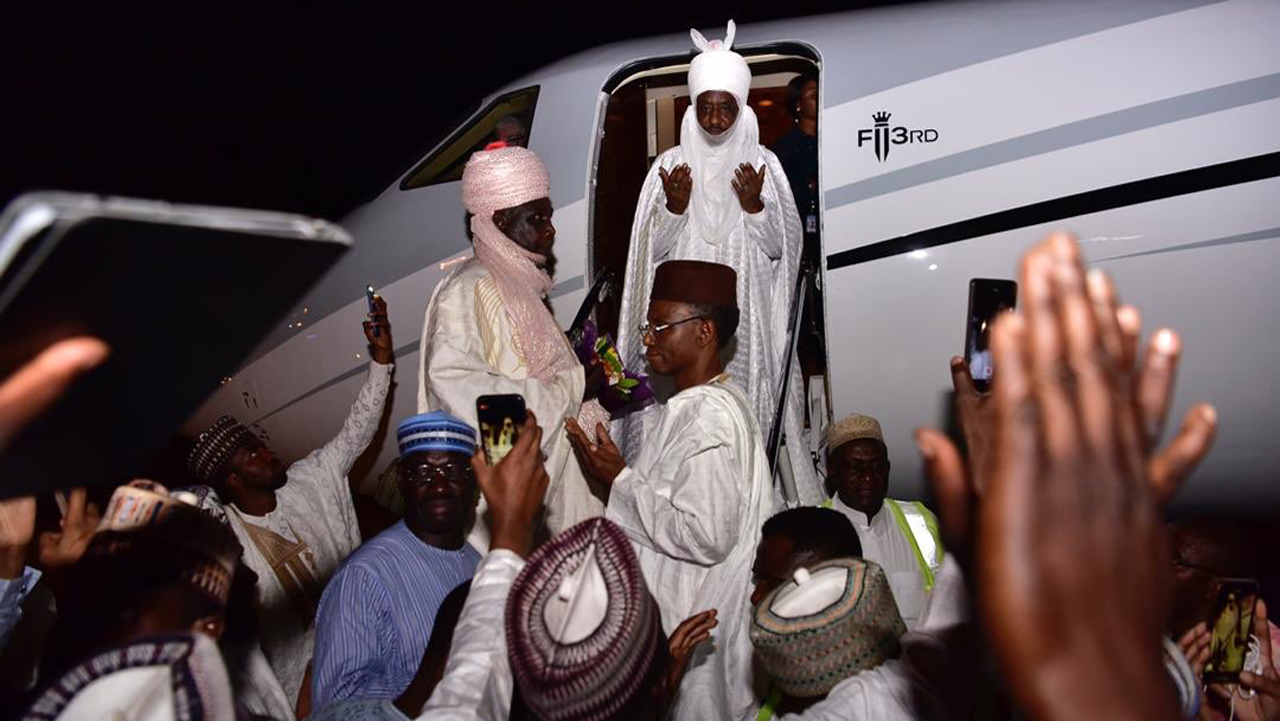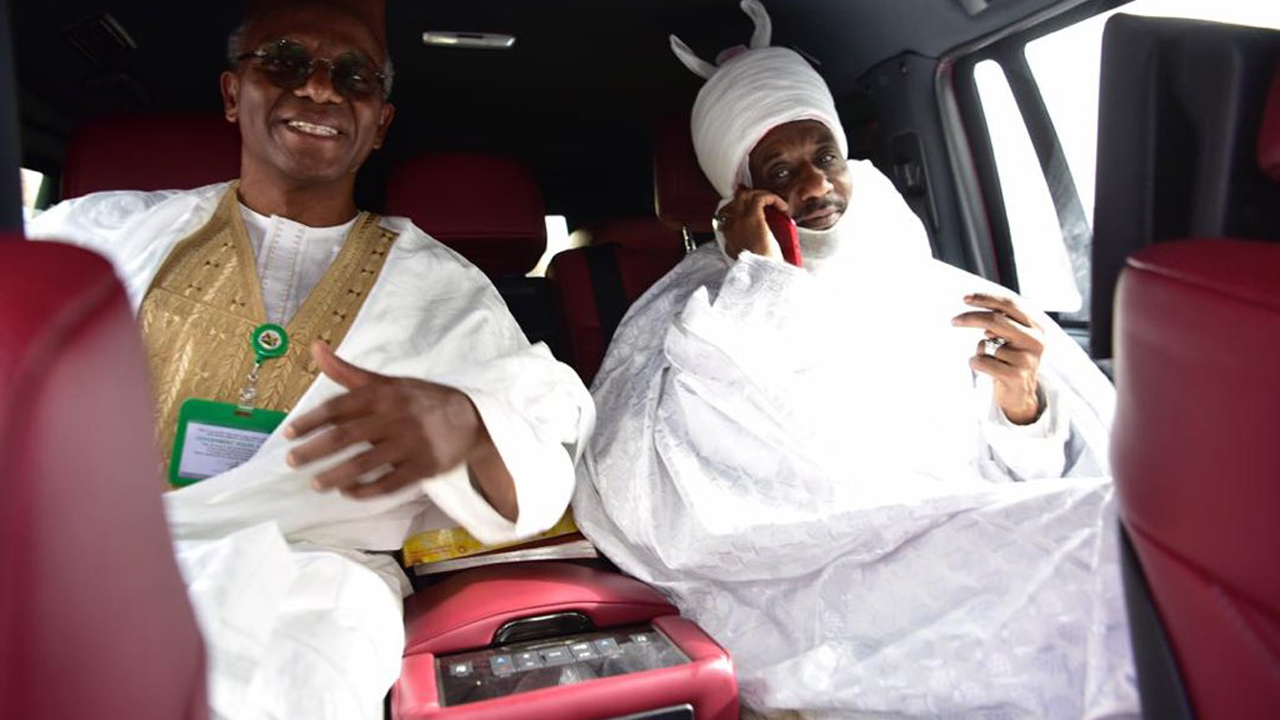
The dethronement and deportation into exile of the 14th Emir of Kano, His Royal Highness, Muhammad Sanusi II, was with fanfare, although a lot discordant bickering between the authorities of Kano State Government and the occupant of the Palace preceded the final overthrow of the monarch.
Eminent persons were assembled to mediate in the face-off between the two ancient and modern government institutions with a view to reaching an amicable settlement of the bone of contention.
Each time there were signs of a breakthrough, some other issues would crop up to diffuse earlier agreements and resolutions. Matters were even taken to court for judicial intervention and interpretation. But being that ego has found a central place in the disagreement, all hopes that normalcy would return faded on the morning of Monday, March 9, 2020.
Mediators
A former Head of State, Abdulsalami Abubakar, was one of the eminent Nigerians that sought to intervene in the misunderstanding between the Kano State Governor, Dr. Abdullahi Umar Ganduje and the deposed Emir.
[related ids=”1125336″]
In an interview with the Hausa Service of Voice of America (VOA), the retired general disclosed that, although his committee submitted a report to President Muhammadu Buhari on what they discovered as being capable of cementing the amicable settlement, he could not say whether the President took it up from there.
General Abubakar and two state governors elected on the platform of All Progressives Congress (APC), namely Governor Kayode Fayemi of Ekiti State, who is also the Chairman of Nigeria Governors’ Forum (NGF) and Senator Atiku Bagudu of Kebbi State, who is also the chairman of progressive Governors’ Forum (PGF), were empanelled by some Northern elders to find an amicable settle to the crisis of confidence between the governor and the Emir of Kano.
The 11 man committee headed by the former Nigeria head of state rounded off their assignment after holding disparate conferences with the parties involved. He noted that “after the conclusion of the assignment, we realised that there was an amicable resolution to the crisis. Surprisingly, this is what happened at last…In my view, all the committee’s efforts are wasted.”
Apart from announcing the dethronement of MSII from office as Emir of Kano, the State Government banished him to a remote village in Nasarawa State, citing “disregard for the state government and Kano Emirate’s traditional norms,” as his offences.
Exile And Backlash
NO sooner had the dethroned Emir been removed from the palace in Kano and flown to his new abode in Nasarawa than a plethora of public denunciations and accusations started making the rounds in the social and orthodox mass media.
Former Kano State governor, Senator Rabiu Kwankwaso, during whose tenure the Emir was crowned, told the British Broadcasting Corporation (BBC) that the directive for Sanusi’s deposition was actually handed out by President Buhari.
And in a swift bid to deflect the negative public reaction to the claim, the Presidency denied that Buhari had any hand in the historical mishap that happened to Sanusi, stressing: “The President does not have a history of intervening in the affairs of any state in the country unless the issue at hand is of national consequence. On such matters which impinge on national security, he has a duty of involvement as the law stipulates.”
In the statement released by the Special Assistant to the President on Media and Publicity, Mallam Garba Shehu did not allude to whether the action was taken on the report from the Abubakar mediation committee. Rather he stated: “As outlined in the Constitution, the appointment or removal of emirs and other traditional leaders is strictly within the jurisdiction of state governments. It is unfair and disingenuous of opposition politicians to try to link the situation in Kano State to the federal government and the Nigerian President.”
Exiled Palace
Having made himself available in his new abode, the deposed Emir began to attract goodwill like bees to the honeycomb. First, the Kaduna State governor, Mallam Nasir El Rufai, who happened to be a maverick like the exiled Emir, decided to appoint him into the board of Kaduna State Investment Promotion Agency (KADIPA).
Coming less than 24 hours of his deposition and banishment, Sanusi’s appointment was according to El Rufai intended to bring his wealth of experience and knowledge to bear in the socio-economic development of Kaduna State.
The statement, which conveyed Sanusi’s appointment, was signed by the Special Adviser on Media and Communication to the governor, Mr. Muyiwa Adekeye. It read: “Kaduna State hopes to benefit from the profile, experience, intellect, and networks of His Highness, Muhammad Sanusi, who before becoming Emir had built a solid reputation in global financial circles. Kaduna State is honoured to be able to call on the services of a man of such calibre to drive its development.”

In quick succession, Kaduna State governor also named the deposed Emir as the Chancellor of Kaduna State University. This time around Sanusi II was named to succeed as the pioneer Chancellor, His Highness, Malam Tagwai Sambo, the Chief of Moro’a, who accepted the role in 2005.
‘’Kaduna State Government has no doubt that as Chancellor, His Highness Muhammadu Sanusi, would provide symbolic and substantive leadership in raising the profile of KASU as an emerging centre of learning on the national and global level,” his letter read.
Within just about 12 hours of his sojourn in his home in exile, the entire Nasarawa State was abuzz as the place was turned into a Mecca of sorts. The more than 40 security personnel detailed to protect the ‘goldfish’ had a hard time profiling and containing high profile visitors.
The village of Awe, which sat in the dark all these years, became a sudden spotlight. The traditional ruler of Loko, the village initially selected to host the exiled Emir, Alhaji Abubakar Ahmed Sabo, told the Hausa Service of BBC that the former CBN governor “slept well in my palace, he has accepted his destiny and harbours no regret.”
The traditional ruler said his community received the deposed Emir with mixed feelings, adding, “We were sad as a result of what happened to him. Though we do not have air-conditioned house befitting of a man of his caliber, we were also happy that our village came to limelight; that, of all the cities in Nigeria, it was Loko that was chosen for him to come to.”
While the exiled Emir was receiving warm sentiments in his new abode, some stakeholders expressed the belief that with his training and exposure, the former CBN governor could not fit into the archaic monarchy that “has no place in modern society.”
A popular Islamic scholar, Sheikh Mahmoud Gumi, dismissed the monarchy as practiced in Nigeria, lamenting that the feudal system has come of age and was due for revision so that a viable and clean foundation could be laid modern statecraft.
As if consoling the deposed Emir, Gumi added: “The monarchy is a vestige of the medieval era, very, unfortunately, turned out to be a bad consequence of both religious misinterpretation and misrepresentation….
“Islam abhors the bowing down of people to mortals except to Allah alone. One cannot claim to be a custodian of Islam and its culture and perpetuate the subservience of man towards a fellow human. And this negative trend is unfortunately what the present-day monarchy only represents.”
Also, Baba Ahmed Joda, in what he called Letter to my son, observed as follows: “Your departure from the Throne of Kano was predictable from your very beginning and from the moment you ascended to it. For Kano and for Nigeria, it may well be a blessing in disguise that you may now be able to address issues that are now urgent for our society as a person not encumbered by the burden of office.
“The purpose of this letter to you is not to commiserate with you, because I know that you must have known the likely consequences of the principled position you have taken.
“The reality we must face in Northern Nigeria is that the evil forces of feudalism that have kept us in bondage for so long are still there and fighting. You have been the only voice that has been telling us this truth. These forces will fight you and you know it. Also, within me, I feel that you have always known about this possibility and that you would be fully prepared for the consequences.
“Very often in the years since your accession to the Throne of Kano, I have tried to imagine what would be the best way for you to disengage from the suffocating burden you have inherited that of service to the people you have chosen to lead better.”
From his brief stint in exile, it could be said of His Highness Muhammad Sanusi Lamido Sanusi II, that even though his traducers meant it for humiliation and diminution, he garnered much public goodwill more than his six years on the throne.
Now, the situation and circumstances have combined to crown him as a global figure and prime advocate for girl child education, poverty eradication as well as social and economic rights.
Though dethroned as Emir of Kano, MSII now reigns effortlessly in the hearts of the people, most of who may have not have known or heard about his tongue troubles with the establishment.






